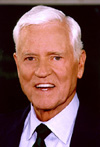| News from May 16-21, 2002 |
 Sen.
Hollings (left), who is also the Chairman of the Committee, explained his bill
in his opening
statement. "What we require simply codifies industry best practices on
the Internet. In fact, this bill gives industry much of what it claims it wants
-- strong preemption, a notice requirement, an opt-out requirement for virtually
all information collected on the Internet, and a process to apply privacy
protections offline, as well as online. But for people's sensitive personal
information -- their debts, income, assets, and medical records, we preserve
consumer control over that information. If companies want to trade and profit in
these sensitive areas -- get consumers' consent. It's that simple. And it's the
right approach."
Sen.
Hollings (left), who is also the Chairman of the Committee, explained his bill
in his opening
statement. "What we require simply codifies industry best practices on
the Internet. In fact, this bill gives industry much of what it claims it wants
-- strong preemption, a notice requirement, an opt-out requirement for virtually
all information collected on the Internet, and a process to apply privacy
protections offline, as well as online. But for people's sensitive personal
information -- their debts, income, assets, and medical records, we preserve
consumer control over that information. If companies want to trade and profit in
these sensitive areas -- get consumers' consent. It's that simple. And it's the
right approach."
 Sen. Allen (right) offered several
amendments. One amendment would have eliminated the private right of action
contained in Section 204 of the bill. It would have provided that "This Act
may not be considered or construed to provide any private right of action. No
private civil action relating to any act or practice governed under this Act may
be commenced or maintained in any State court or under State law (including a
pendent State claim to an action under Federal law)."
Sen. Allen (right) offered several
amendments. One amendment would have eliminated the private right of action
contained in Section 204 of the bill. It would have provided that "This Act
may not be considered or construed to provide any private right of action. No
private civil action relating to any act or practice governed under this Act may
be commenced or maintained in any State court or under State law (including a
pendent State claim to an action under Federal law)."